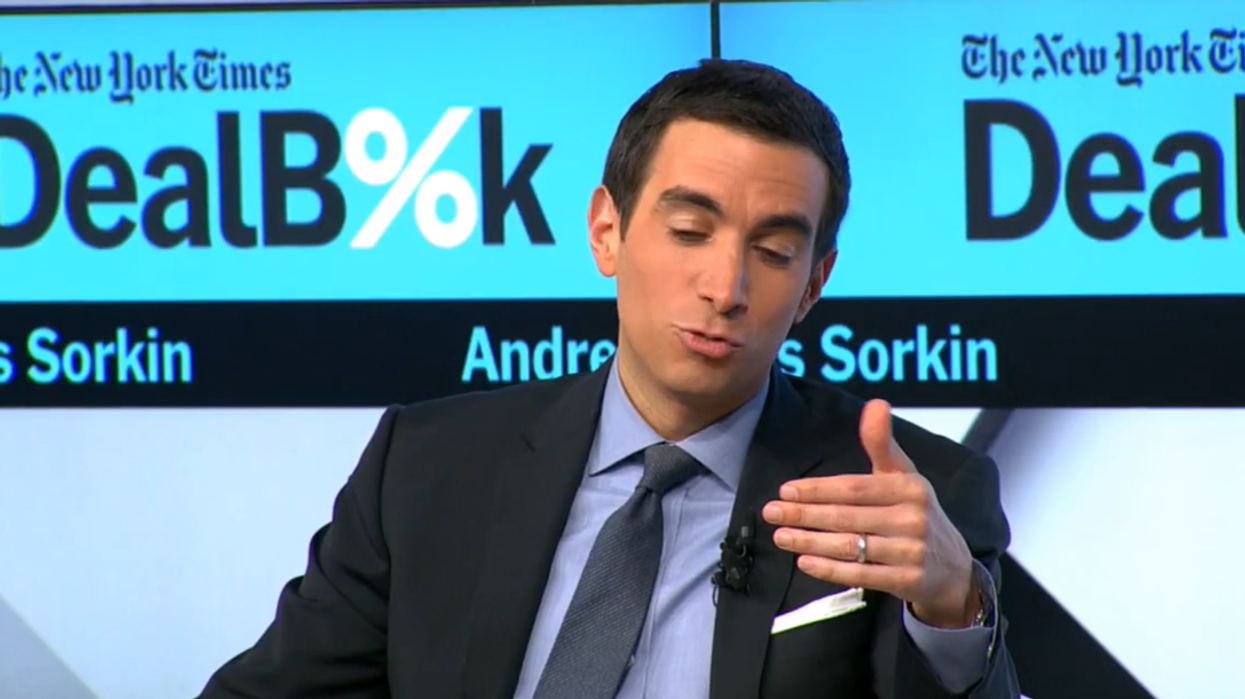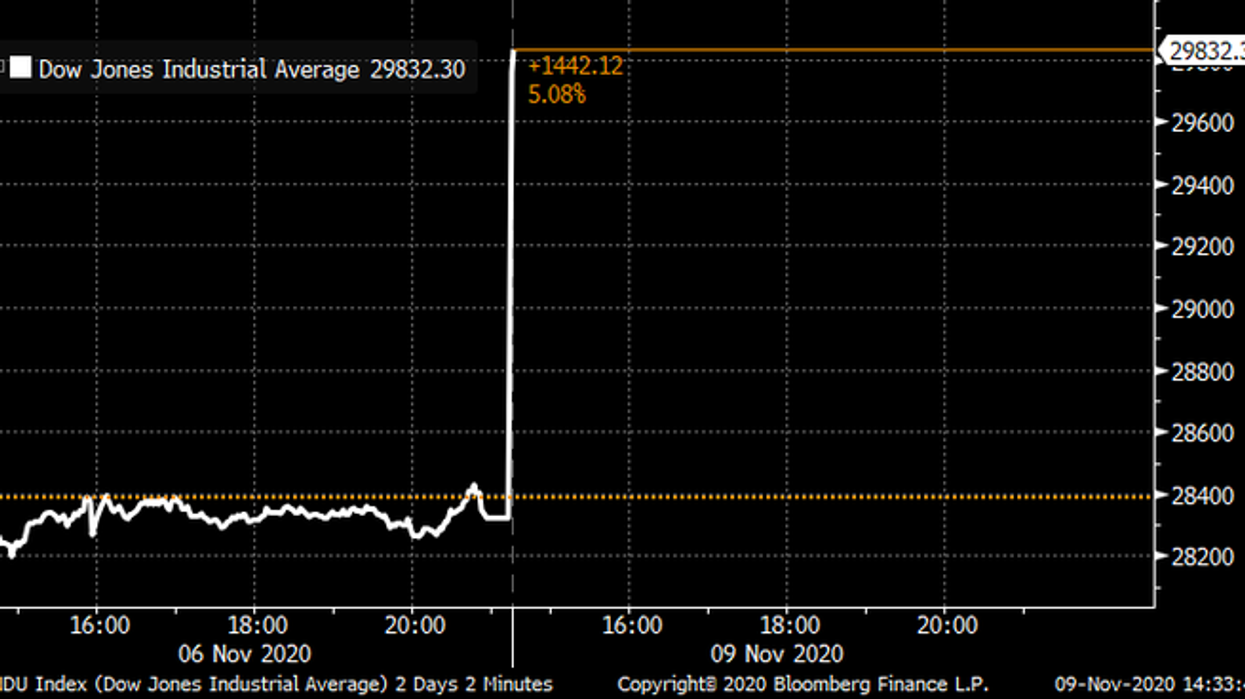On July 6, 2020, he tweeted, "If you want your 401k's and Stocks, which are getting close to an all time high (NASDAQ is already there), to disintegrate and disappear, vote for the Radical Left Do Nothing Democrats and Corrupt Joe Biden."
And on July 27, 2020, he further tweeted that "if Sleepy Joe Biden, the puppet of the Left, ever won. Markets would crash and cities would burn. Our Country would suffer like never before."
Meanwhile, the meme is spreading. CCN Markets was quoting traders saying that a Biden win would cut 25 percent from the stock market, and Forbes is suggesting Biden "would be bad for businesses and could negatively impact the stock market." Yahoo Finance quotes AdvisorShares CEO Noah Hamman as saying "a 25 percent decline is not an unreasonable expectation" if Biden wins.
Even the New York Times got into the act, with Matt Phillips writing that "the Trump tax cuts were a windfall for major American corporations, helping to drive up the profitability of companies in the S&P 500 more than 20 percent in 2018." The suggestion is that reversing that tax cut will drive profitability down, and stock prices would follow.
All of these scenarios simply envision Biden removing the "sugar high" of unusually low corporate and billionaire tax rates through a Biden reversal of Trump's $1.5 trillion tax cut.
But what if Trump decides he wants a slice of his favorite meal—revenge—and will get it during the nearly three months between the November 3 election and Biden's inauguration on January 20?
What if Trump decides to punish America for not being sufficiently loyal to him, and that punishment is to drive America into a second Republican Great Depression while he's handing the government over to Biden?
He now has the power to make this Depression, amplified by the pandemic, far, far worse than the Republican Great Depression of 1930, now that he's cowed the Fed. It's almost like it was set up in advance.
Jerome Powell is the first Fed chief in two generations who's not an economist; instead, he's a lawyer, a multimillionaire private equity banker, and former partner with the Carlyle Group, whose BA was in politics.
And politics is where Powell shines. In a complete abrogation of the rules governing the Fed, he's created roughly $7 trillion (one-third of the entire nation's normal annual GDP) out of thin air and used much of that money to buy corporate stock and bonds to keep the stock market afloat.
In its 107-year history, the Fed has never, ever done this; some observers consider it illegal.
And the rest of the world is watching, as the dollar drops in value (and gold skyrockets) relative to other currencies, another sign that both inflation and economic disaster are on the horizon.
So, imagine that all the ballots are counted on, say, November 20, and Joe Biden is declared the winner. The next day, the Fed stops supporting the stock and corporate bond markets, and the Dow drops over the following few months to 7,800, roughly where it was in October 2008, the last time a Republican administration goosed the economy to keep things looking good until an election (although Bush mistimed it by a bit short of a year).
Making things even worse, Powell could announce that he's actively working to drive up interest rates (a function related to inflation).
That would cause a tsunami of corporate bankruptcies (corporate debt is currently higher than any other time in American history) and a collapse of the housing market just as Biden is stepping into the White House.
Powell recently suggested he's considering just such a move, as CNBC reported on August 4 with the headline: "The Fed is expected to make a major commitment to ramping up inflation soon."
If Trump and Powell do this, Republican commentators will be all over TV and other media saying that the crash was entirely because Biden was elected. It'll be a bald-faced lie, but the GOP has been peddling this kind of crap since the Reagan Revolution.
Getting our economic house in order, then, will be a more herculean effort than Franklin Delano Roosevelt pulled off after Republican President Herbert Hoover's tax-cut and deregulation policies crashed the economy in 1930, and could take well over a decade.
And then there's the matter of Trump showing the fascists in the GOP where the weaknesses are in our three branches of government. If a major market crash and even more widespread unemployment, homelessness and hunger than we're experiencing today were to ripple across the country, a surge of protesters into the streets is probable.
And Trump's been rehearsing how to respond to that, particularly in Portland, as Charles P. Pierce lays out in Esquire.
This would play right into the hands of right-wing groups that are openly working for a race-based second civil war, a replay of The Turner Diaries, the book that inspired Timothy McVeigh.
Trump and Attorney General William Barr have already revealed a number of areas where our rule of law is sadly deficient, including the inability to hold a president to account for crimes he has committed while in office and the damage a president can do by gutting almost every federal agency and then putting lobbyists in charge of them.
Many of the holes, cracks and weaknesses in our republic that Trump has exploited were put into place by the Supreme Court in the 1970s and by Congress after 9/11. It's so bad that the headline of a Rolling Stone article by David S. Cohen notes, "Donald Trump is trying to start a race war. And with the Insurrection Act, he has the statutory authority to do so."
America needs a major reboot.
The Buckley v. Valeo and First National Bank of Boston v. Bellotti Supreme Court decisions of the 1970s gave corporations and billionaires the "free speech right" to own politicians and political parties, and the Patriot Act and other similar legislation since 9/11 have given the president vast police powers that, throughout history, we've only seen in authoritarian, strongman governments.
We must reevaluate, rescind, and replace all of these, if our republic is to survive the fresh hell that Trump and his right-wing paramilitaries are apparently planning for this fall and winter.
If Democrats acquire federal power through holding the House and taking the Senate and White House, the entire country needs to be laser-focused on stripping the oligarchic and fascistic elements that have crept into our republic since the Powell memo, multiple Supreme Court interventions, and the Patriot Act with its associated war crimes and torture.
America today is at a turning point, and whether we continue our slide into fascism and oligarchy, or pull back to small-d democratic values will depend, in no small part, on the planning and work we do now, and the candidates and policies we support and put forward two and four years from now.
THOM HARTMANN
Thom Hartmann is a talk-show host and the author of "The Hidden History of the Supreme Court and the Betrayal of America" and more than 25 other books in print. He is a writing fellow at the Independent Media Institute.












